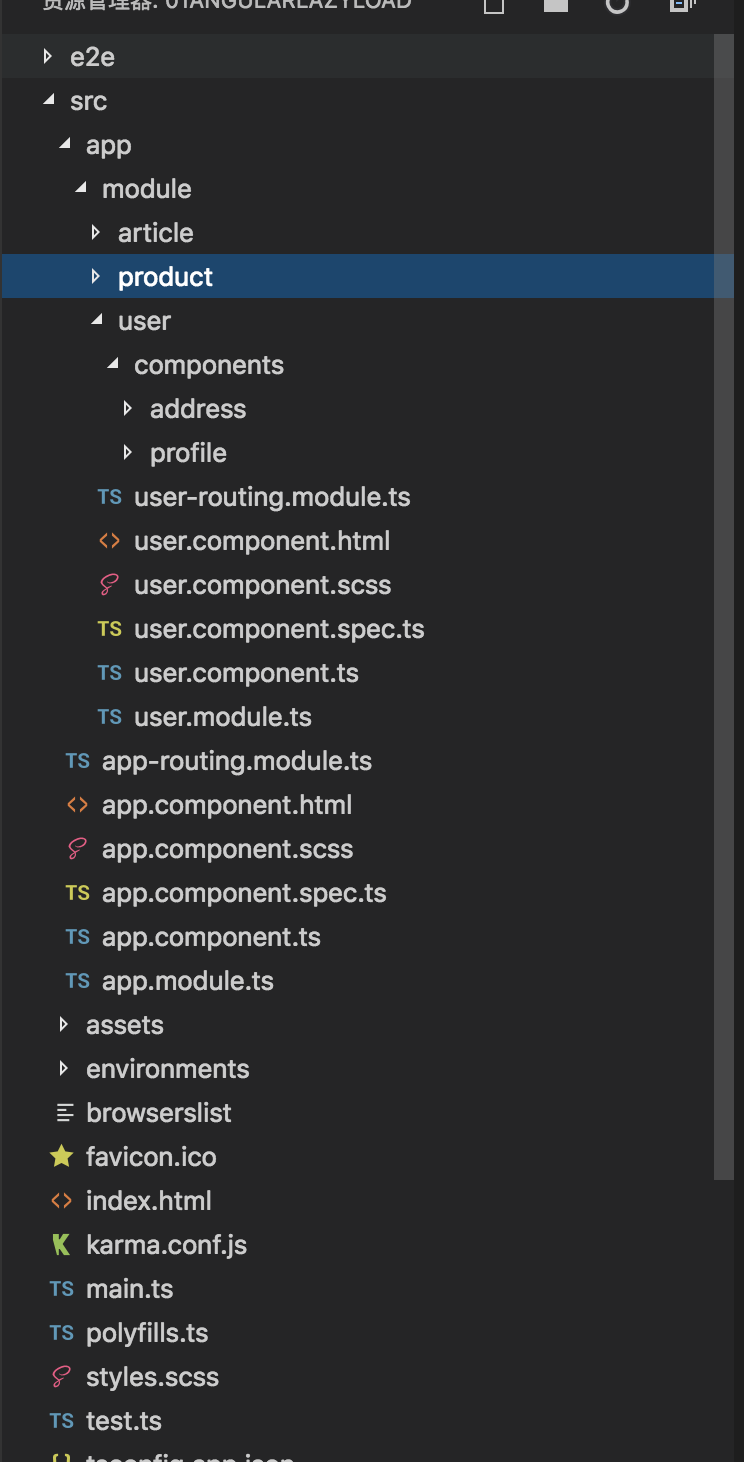Angular 自定义模块以及配置路由实现模块懒加载
项目目录

创建模块
ng g module module/user --routing
ng g module module/article --routing
ng g module module/product --routing
创建组件
ng g component module/user
ng g component module/user/components/profile
ng g component module/user/components/order
ng g component module/article
ng g component module/article/components/articlelist
ng g component module/article/components/info
ng g component module/product
ng g component module/product/components/plist
ng g component module/product/components/pinfo
1.app.module.ts
import { BrowserModule } from '@angular/platform-browser';
import { NgModule } from '@angular/core';
import { AppRoutingModule } from './app-routing.module';
import { AppComponent } from './app.component';
@NgModule({
declarations: [
AppComponent
],
imports: [
BrowserModule,
AppRoutingModule
],
providers: [],
bootstrap: [AppComponent]
})
export class AppModule { }
app.component.html
<header>
<a [routerLink]="['/user']">用户模块</a>
<a [routerLink]="['/article']">文章模块</a>
<a [routerLink]="['/product']">商品模块</a>
</header>
<router-outlet></router-outlet>
app-routing.module.ts
import { NgModule } from '@angular/core';
import { Routes, RouterModule } from '@angular/router';
const routes: Routes = [
{
path:'user',loadChildren:'./module/user/user.module#UserModule'
},
{
path:'article',loadChildren:'./module/article/article.module#ArticleModule'
},
{
path:'product',loadChildren:'./module/product/product.module#ProductModule'
},
{
path:'**',redirectTo:'user'
}
];
@NgModule({
imports: [RouterModule.forRoot(routes)],
exports: [RouterModule]
})
export class AppRoutingModule { }
用户模块user.module.ts
import { NgModule } from '@angular/core';
import { CommonModule } from '@angular/common';
import { UserRoutingModule } from './user-routing.module';
import { UserComponent } from './user.component';
import { ProfileComponent } from './components/profile/profile.component';
import { AddressComponent } from './components/address/address.component';
@NgModule({
declarations: [UserComponent, ProfileComponent, AddressComponent],
imports: [
CommonModule,
UserRoutingModule
]
})
export class UserModule { }
user-routing-module.ts
import { NgModule } from '@angular/core';
import { Routes, RouterModule } from '@angular/router';
import { UserComponent } from './user.component';
import { ProfileComponent } from './components/profile/profile.component';
import { AddressComponent } from './components/address/address.component';
const routes: Routes = [
{
path:'',component:UserComponent
},
{
path:'profile',component:ProfileComponent
},
{
path:'address',component:AddressComponent
}
];
@NgModule({
imports: [RouterModule.forChild(routes)],
exports: [RouterModule]
})
export class UserRoutingModule { }
其他模块类似配置
自定义模块的父子路由
import { NgModule } from '@angular/core';
import { Routes, RouterModule } from '@angular/router';
import { ProductComponent } from './product.component';
import { PlistComponent } from './components/plist/plist.component';
import { CartComponent } from './components/cart/cart.component';
import { PcontentComponent } from './components/pcontent/pcontent.component';
const routes: Routes = [
{
path:'',component:ProductComponent,
children:[
{path:'cart',component:CartComponent},
{path:'pcontent',component:PcontentComponent}
]
},
{path:'plist',component:PlistComponent}
];
@NgModule({
imports: [RouterModule.forChild(routes)],
exports: [RouterModule]
})
export class ProductRoutingModule { }
Angular 自定义模块以及配置路由实现模块懒加载的更多相关文章
- angular配置懒加载路由的思路
前言 本人记性不好,对于别人很容易记住的事情,我愣是记不住,所以还是靠烂笔头来帮我长长记性. 参考文章:https://blog.csdn.net/xif3681/article/details/84 ...
- Angular性能优化实践——巧用第三方组件和懒加载技术
应该有很多人都抱怨过 Angular 应用的性能问题.其实,在搭建Angular项目时,通过使用打包.懒加载.变化检测策略和缓存技术,再辅助第三方组件,便可有效提升项目性能. 为了帮助开发者深入理解和 ...
- vue-cli 项目实现路由懒加载
在vue 单页应用中,如果路由不实现懒加载,那么打包出来的文件将会非常大,加载也会非常慢.vue-router 官网也有相应的介绍,但是具体怎么去实现还是讲的比较模糊的,下面将一步步讲解配置路由懒加载 ...
- vue路由懒加载
大项目中,为了提高初始化页面的效率,路由一般使用懒加载模式,一共三种实现方式.(1)第一种写法: component: (resolve) => require(['@/components/O ...
- vue2.x 路由懒加载 优化打包体积
当打包构建应用时,Javascript 包会变得非常大,影响页面加载.如果我们能把不同路由对应的组件分割成不同的代码块,然后当路由被访问的时候才加载对应组件,这样就更加高效了. 结合 Vue 的异步组 ...
- vue+webpack2实现路由的懒加载
当打包构建应用时,Javascript 包会变得非常大,影响页面加载.如果我们能把不同路由对应的组件分割成不同的代码块,然后当路由被访问的时候才加载对应组件,这样就更加高效了. 结合 Vue 的异步组 ...
- 「Vue.js」Vue-Router + Webpack 路由懒加载实现
一.前言 当打包构建应用时,Javascript 包会变得非常大,影响页面加载.如果我们能把不同路由对应的组件分割成不同的代码块,然后当路由被访问的时候才加载对应组件,这样就更加高效了.结合 Vue ...
- 路由懒加载---Vue Router
一.什么是懒加载? 懒加载也就是延迟加载或者按需加载,即在需要的时候进行加载. 二.为什么在Vue路由中使用懒加载? 像vue这种单页面应用,如果没有应用懒加载,运用webpack打包后的文件将会异常 ...
- 18-Angular 自定义模块以及配置路由模块懒加载
新建项目,新建几个子模块,实现懒加载 用户.商品.文章 新建这三个模块 创建模块的时候后面加 --routing.会自动生成模块的路由文件 先删掉. 重新创建模块带routing 这样就会生成两个文件 ...
随机推荐
- es其他常用功能
es6除了模块化,class,promise,还有一些其他的常用功能. 1.let/const let是定义一个变量,但是这个变量可以重新赋值,const是定义一个常量,这个常量不能重新赋值 let ...
- 运输层2——用户数据报协议UDP
目录 1. UDP概述 2. UDP首部格式 3. UDP首部检验和计算方法 写在前面:本文章是针对<计算机网络第七版>的学习笔记 运输层1--运输层协议概述 运输层2--用户数据报协议U ...
- python函数式编程-装饰器
在代码运行期间动态增加功能的方式,称之为“装饰器”(Decorator). 由于函数也是一个对象,而且函数对象可以赋值给变量,所以通过变量也能调用该函数. >>> def now() ...
- 读入 并查集 gcd/exgcd 高精度 快速幂
ios_base::sync_with_stdio(); cin.tie(); ], nxt[MAXM << ], Head[MAXN], ed = ; inline void added ...
- 1. let与const
1.ES6 新增了let命令,用来声明变量.它的用法类似于var,但是所声明的变量,只在let命令所在的代码块内有效. var a = []; for (var i = 0;i<10;i++) ...
- WEB知识补充 支付宝 支付
- vue 项目总结 知识点补充
1.页面加载后自动执行函数 2.向后端请求数据方法 2-1 :axios 的安装使用 2-2 在组件中使用 2-3 发送请求 2-4 接收数据后渲染 2-5 后端数据渲染 2-6 解决跨域问题 任务 ...
- ModelAndView返回Json格式的数据
第一种方式: 1.自定义类JacksonUtil.java,类中实现tojson方法(即将数据转成json类型): 2.自定义类JsonView 继承 AbstractView 3.xml中配置bea ...
- Vue中使用matomo进行访问流量统计的实现
Vue中使用matomo进行访问流量统计 原文链接 前言 之前做到了一个页面及接口访问流量统计的需求, 然后在网上找了很多帖子,发现有些有的但是写的都不是很详细,所以今天就整理了一下 正文 第一步 首 ...
- MySQL Multi-Range Read(MRR 索引多范围查找) 原理与解析
原理: 如果基表很大,数据没有被缓存,在二级索引上使用范围扫描读取行可能会导致大量的随机磁盘访问.使用Multi-Range Read新特性,mysql可以减少对磁盘的随机读的次数:首先,mysql只 ...
